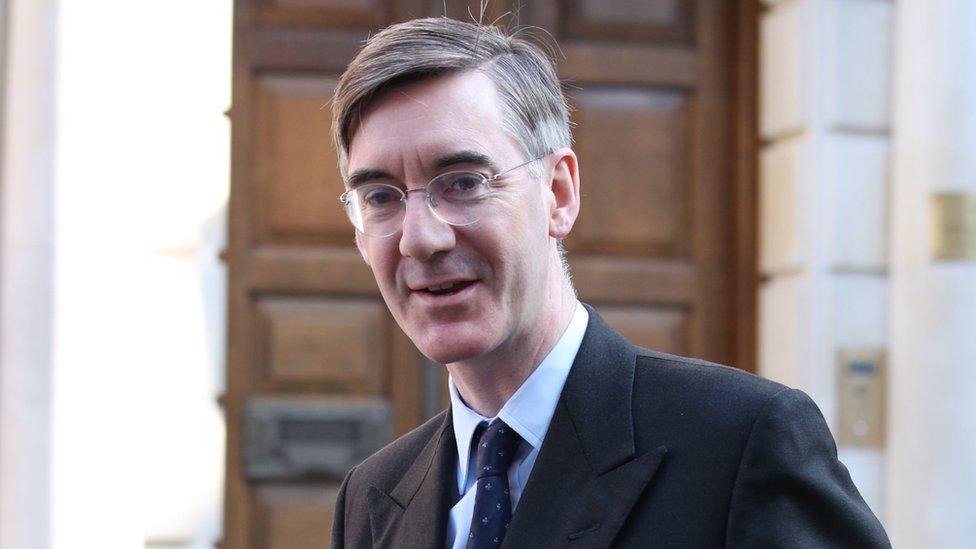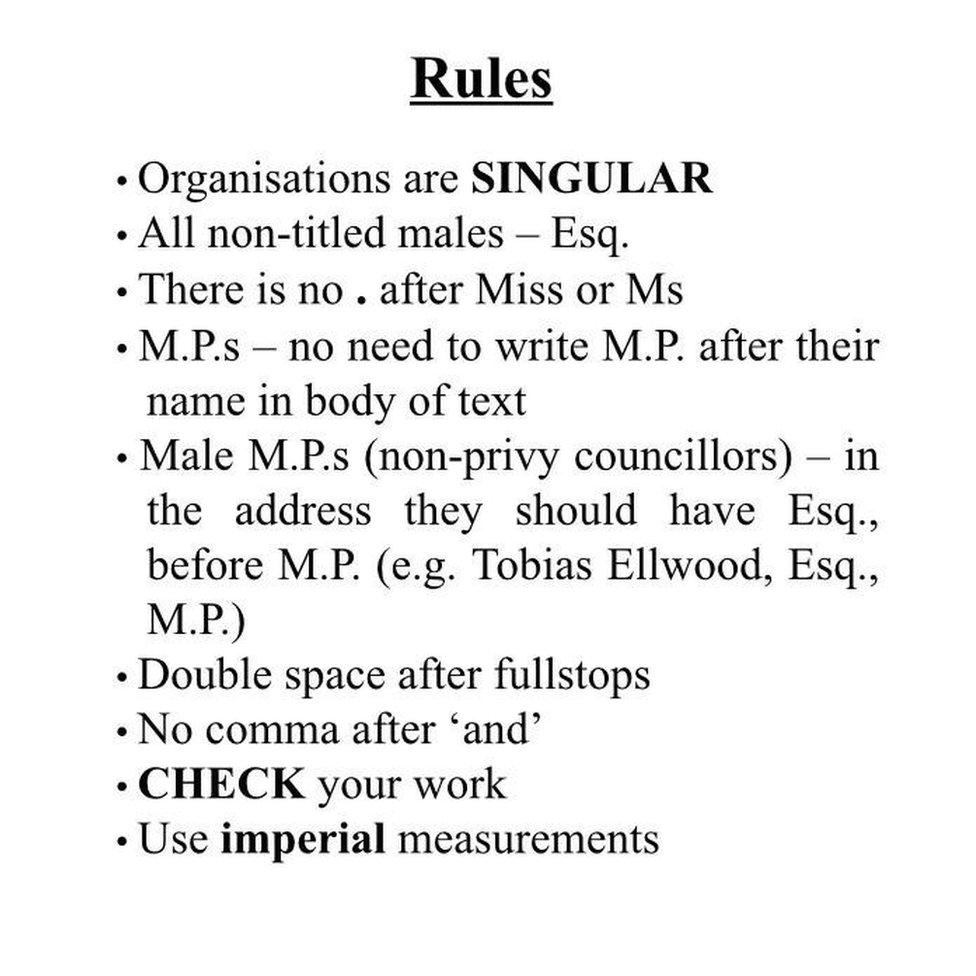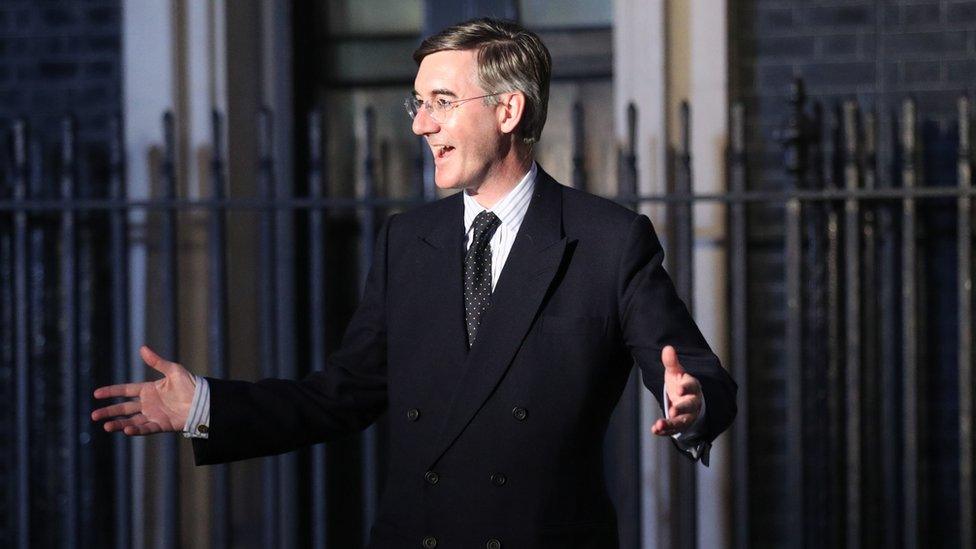Jacob Rees-Mogg: Is he right to ban these words?
- Published

How do you make an impression in a new job?
Conservative MP Jacob Rees-Mogg began his new role as the leader of the House of Commons by issuing a style guide to all staff members in his new office.
His rules, according to ITV News,, external include banning his staff from using words such as "very", "lot" and "got" when writing to other MPs and members of the public.
Mr Rees-Mogg, who was brought into government by the new prime minister this week, has also asked staff in his new office to use imperial measurements and refer to non-titled males as "esquire".
The guidance was drawn up by Mr Rees-Mogg's North East Somerset constituency team some years ago, but has now been shared with officials in his new office.

What has been banned?
Very • due to • ongoing • hopefully • unacceptable • equal • too many "I"s • yourself • lot • got • speculate • invest (in schools etc) • no longer fit for purpose • I am pleased to learn • meet with • ascertain • disappointment • I note/understand your concerns


The revelation has sparked quite a reaction on social media, including from fellow MPs - Labour's Chris Bryant and Angela Rayner.
Allow X content?
This article contains content provided by X. We ask for your permission before anything is loaded, as they may be using cookies and other technologies. You may want to read X’s cookie policy, external and privacy policy, external before accepting. To view this content choose ‘accept and continue’.

Allow X content?
This article contains content provided by X. We ask for your permission before anything is loaded, as they may be using cookies and other technologies. You may want to read X’s cookie policy, external and privacy policy, external before accepting. To view this content choose ‘accept and continue’.

Lynne Murphy, professor of linguistics at the University of Sussex, says he is not the first MP to make such a request. Michael Gove also laid out some language rules for his civil servants in 2015,, external which included never using the word "impact".
Prof Murphy says Mr Rees-Mogg's style guide does not necessarily relate to grammatical rules or other language rules, but seems more aimed "at preserving his antique vibe".
The Tory MP, a prominent Brexiteer, is known for his formal dress and love of tradition.
Distinguishing male MPs by status using "Esq" and telling staff to use imperial measurements, says Prof Murphy, is more of "a comment about his political position on societal change rather than about language".
The EU has issued several directives over the decades asking member states to use metric measurements. Imperial measurements began being phased out in the UK in the 1960s.
'Humpty Dumptyish'
Mr Rees-Mogg has previously spoken of his dislike of one of the banned words - "unacceptable" - in the House of Commons.
In 2016, he said: "Appropriate, inappropriate, unacceptable and disappointing are those new Labour words that get dropped into conversations and they mean remarkably little or what, in a Humpty Dumptyish way, what the person hearing them wishes to think that they mean."
One of his rules - no comma after "and" - has proved particularly controversial on social media.
Prof Murphy says: "That's not something one needs to ban, since no-one does it in the first place. One assumes he was trying to ban the so-called Oxford comma which occurs before 'and'."
Allow X content?
This article contains content provided by X. We ask for your permission before anything is loaded, as they may be using cookies and other technologies. You may want to read X’s cookie policy, external and privacy policy, external before accepting. To view this content choose ‘accept and continue’.
Allow X content?
This article contains content provided by X. We ask for your permission before anything is loaded, as they may be using cookies and other technologies. You may want to read X’s cookie policy, external and privacy policy, external before accepting. To view this content choose ‘accept and continue’.

Prof Murphy compares trying to ban the word "got" as "like trying to ban sneezing", as it is in the top 10 most common verbs in English and is indispensible to many expressions.
This is something Mr Rees-Mogg discovered for himself on Wednesday as he made his despatch box debut in the House of Commons.
In one exchange, he said: "Mr Speaker, we have got perambulators and nannies into this session, which I think must be a first for questions to the Leader of the House."
According to the Guardian,, external the official transcript of parliamentary proceedings, Hansard, recorded more than 700 instances of Mr Rees-Mogg using one or other of the banned words or phrases.
Prof Murphy adds: "The words and phrases he's banned look to be a combination of the kinds of things teachers might have given him a hard time for in school (complaining about "got" was more fashionable in the mid-20th Century than recently) and expressions he feels are overused or imprecise."
So should all work places have a style guide on how to communicate?
Prof Murphy is not a fan. "Those who really love language enjoy its creative use, rather than trying to stifle it," she says.
- Published24 July 2019

- Published24 July 2019
